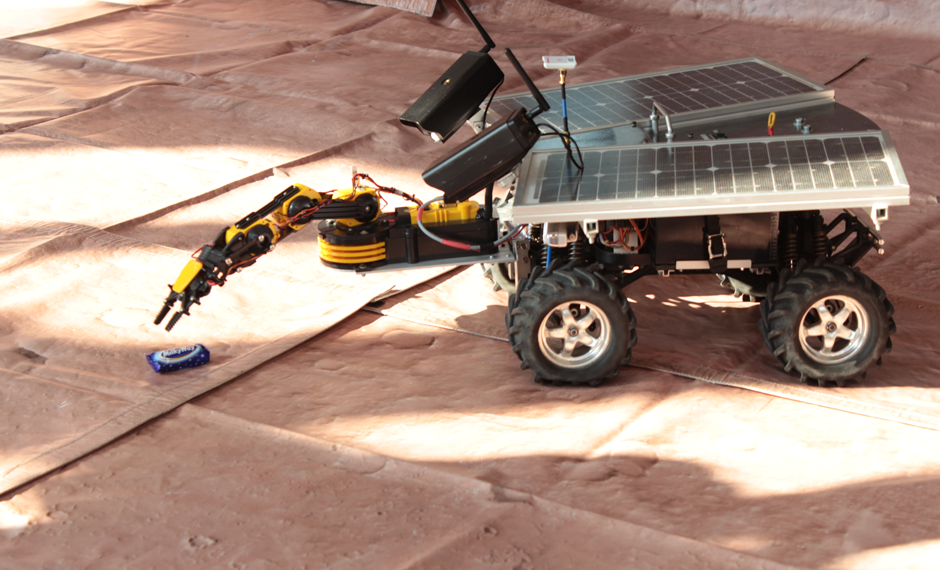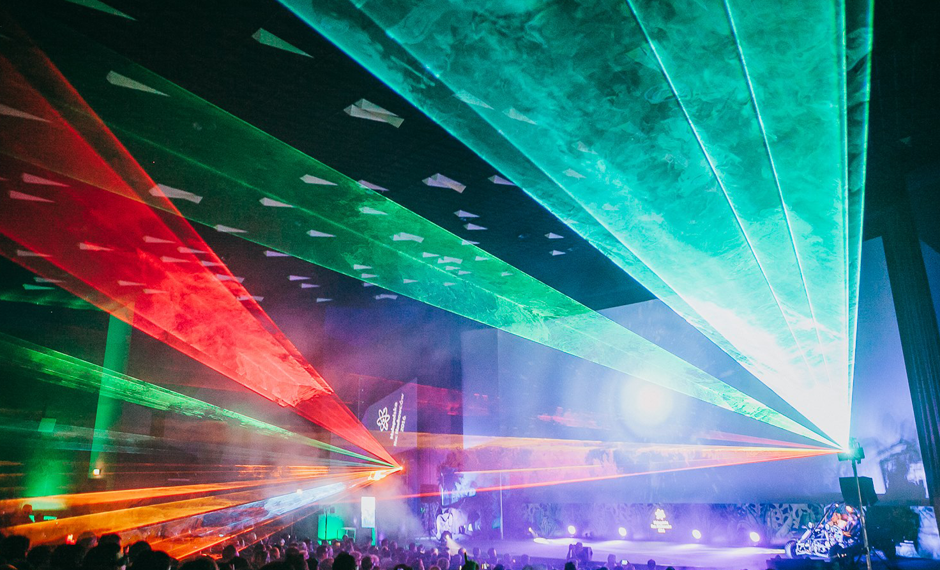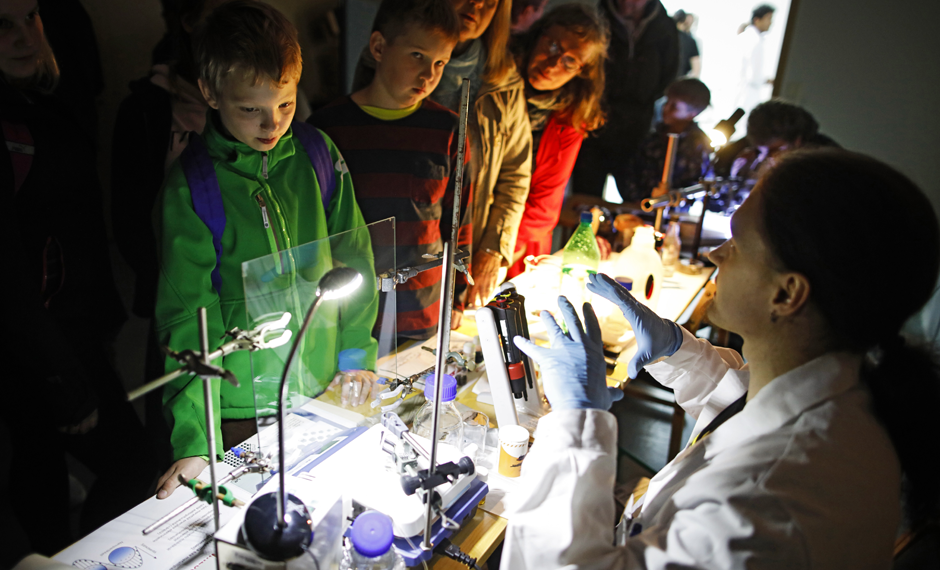Summer is already over and the nights are getting longer. However, one of them will be very special this Autumn. On Friday 28 September, it’s European Researchers’ Night.
In over 370 cities across Europe and in some neighbouring countries, thousands of universities, laboratories, museums, scientific institutions and companies will open their doors to the public to share their knowledge and passion for research. From Reykjavik to Ankara, researchers will share their knowledge and technology in many different disciplines: from physics to biology, from archeology to social sciences.
European Researchers’ Night, which has been held every year since 2005 on the last Friday of September, is a celebration of science and an opportunity to become a part of the vibrant scientific community. Through talks, workshops, guided tours, shows and exhibitions ordinary people across Europe will have a chance to visit places that are very often closed to general public, learn how science shapes our modern world and meet the scientists behind it in person. Last year, over one million people took that opportunity.
As preparations for events across Europe are being finalised, we caught up with a number of organisers to find out about activities happening in different countries.
Planet 2.0 in London
If you are in London, you can drop by the Natural History Museum, where over 200 researchers will be explaining in various ways how their work is transforming our planet to a place where both people and the Earth itself can thrive. You will be able to meet Archie – a giant squid preserved in a huge 9-meter long tank or build your own robot. If you need some human interaction though, visit the EU Pub in the central café, where you will be able to grab a drink with one of the brightest minds and ask them thought-provoking questions.
Robots in Vienna
Robots will also be taking over Vienna during an event named Sci4all organised by the Practical Robotics Institute Austria (PRIA). During the day, visitors will be able to build, program and interact with these machines. Besides the robots, this year’s focus is on engaging a younger public:
– The last two years we have noticed less younger children attending, so that’s why this year we are running special school workshops during the day. We are also organising a teen science slam where kids aged between 10 and 15 years old will present their scientific projects, says Munir Merdan, Scientific Director of PRIA.

Behind closed doors
In Poland, the home country of Marie Skłodowska-Curie, the first person to win two Nobel prizes, Researchers’ Night is being organised under the name ‘Małopolska Researchers’ Night’. So if you are hungry for knowledge, head to any of the 11 participating cities, for example Krakow, where a forensic science laboratory is opening its doors to reveal its secrets. And this only happens on this one day each year.
– It’s an extremely popular event and available places disappear within minutes of registration opening, says Elżbieta Sztorc-Szcząber, PhD and Head of the Unit organising Małopolska Researchers’ Night at the Marshal Office of the Małopolska Region.
Some other doors will remain closed and it’s up to visitors to get them to open as they try to escape the mathematics/informatics Escape Room. And if you are hungry not only for science, you can always grab a bite at the molecular gastronomy show.
Researchers’ Night proved to be more interesting than other sport or pop culture events in the region.
The event in Poland is not only growing in terms of the numbers (from only one city in 2007 to 11 this year) but also in its importance:
– Each year, we ask people who participated in the event for their opinion about it, and last year, for the first time, Researchers’ Night proved to be more interesting to them than other sport or pop culture events in the region. We also have many examples of people who really got inspired by Researchers’ Night and decided to pursue a scientific career later in their lives, adds Elżbieta Sztorc-Szcząber.

From nano to macro scale
More than 1,300 km north of Kraków in Jyväskylä, Finland, where the temperature might drop to 4 degrees Celsius, this cold September night will be warmed up with lots of exciting events. The common theme for this year’s event is “traces”:
– This can be traces of what humankind leaves in nature or traces of science in our everyday lives, explains Janne Pakarinen, a Research Fellow at the University of Jyväskylä and the main coordinator of the event in Finland.
Visitors are invited to try to find these traces on a nano – and macro scale, for example by exploring cyclotron – a particle accelerator.
no one is allowed to enter the bunker because of the radiation, but especially for this occasion, we are turning it off, so that people can go inside and see it up close.
– Our cyclotron runs 24/7 and no one is allowed to enter the bunker because of the radiation, but especially for this occasion, we are turning it off, so that people can go inside and see it up close, says Janne.
And if you didn’t already know, you will find out that Pokémon is based on a real species, so you can also learn about evolution in a fun way!

Researchers’ Friday
In Sweden, ForskarFredag (Researchers’ Friday) will take place in 28 cities and towns across the country. So don’t worry if you can’t visit any of Sweden’s neighbours – you will find a lot of activities here as well. For the first time, some of the activities are also taking place on the Saturday.
All of these efforts aim to create a meeting platform for open dialogue between scientists and the public. It gives people the opportunity to learn about basic research as well as the most advanced modern technologies. It is also a chance for the researchers themselves to share their passion and showcase their work, which very often only ends up in specialised scientific journals. A shortage of STEM (science, technology, engineering and mathematics) graduates is a general concern in more than one country, so the day is particularly used to inspire young people and encourage them to pursue a career in these fields.
These are just a few ways to enjoy European Researchers’ Night. There is a lot more happening. European Researchers’ Night is supported by the European Commission as part of the Marie Skłodowska-Curie Actions. You can find a full map of the participating cities here.
So plan it well in advance, because time is limited and researchers haven’t invented teleportation yet!
